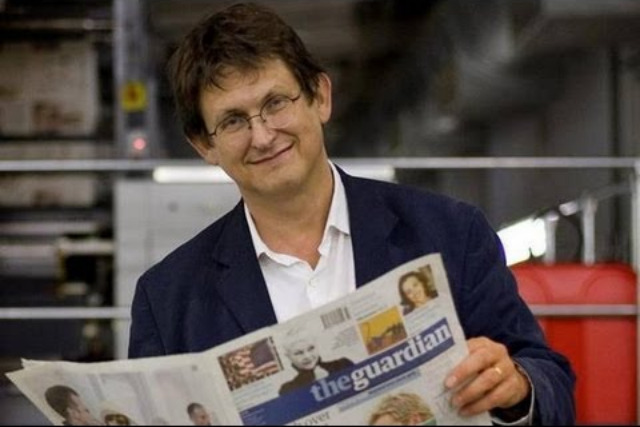
The Guardian shared the Pulitzer for public service journalism with the Washington Post today for revelations of widespread secret surveillance by the NSA, based on the leaks of Edward Snowden.
The award comes 10 months after the Guardian published the first report based on the leaks from Snowden, revealing the agency’s bulk collection of US citizens’ phone records.
Snowden called the recognition "a vindication for everyone who believes that the public has a role in government".
He added in a statement: "We owe it to the efforts of the brave reporters and their colleagues who kept working in the face of extraordinary intimidation, including the forced destruction of journalistic materials, the inappropriate use of terrorism laws, and so many other means of pressure to get them to stop what the world now recognises was work of vital public importance."
Revelations are no accident
Speaking at a Newsworks event ahead of receiving the award, The Guardian’s editor in chief, Rusbridger, said the Snowden scoops "don’t fall into your lap by accident", but rather are the result of a cultural environment borne out of editorial decisions.
The Guardian’s editorial leader of 19 years believes after the global economic downturn in 2008, "quite a lot of newspapers made a fatal mistake, and forgot what business they were in, and jettisoned the stuff that seemed difficult and expensive, and where it wasn’t apparent that there was a direct link to revenue".
He added: "It seemed to us there was a fork in the road between being closed and being open."
This approach is credited for The Guardian embracing bloggers at a time where there was a "sneering disdain" among other media outlets.
Rusbridger said: "By the time we hired Glenn Greenwald, a blogger who does work from his front room in Rio [de Janeiro] writing about national security, he had something like a community of a million people, who were deeply interested in his journalism, and they came with him.
"The New York Times would never have hired Glenn Greenwald, they just wouldn’t. But we did.
Rusbridger said Greenwald thought, "'The Guardian is the most open platform, and I will get to 90 million plus people through this, and that is of interest to me'."
In a passing shot at rivals like News UK now sitting behind paywalls, he added: "Completely uninteresting was something that is hidden off by the [pay] wall, with a very small audience, and still on the 19 Century model of what information is."
The formation of an immensely complicated story
Described as an "immensely complicated story", the Guardian’s editorial chief said by the time Snowden joined the publisher, the NSA information was "in different parcels in four different countries in three different continents".
He said that together with the nature of the material, the communications involved and the reporting that went on, "it was easily the most pivotal story - ethically, legally – that any of us have ever handled".
He added: "It probably involved a dozen people or more in reporting terms, and more people in terms of the technology and legally. The legal bills have been very substantial. In pure accountancy terms, not really worth it.
"If you’re thinking in 2008, ‘what can we cut, what’s worth doing, what’s not worth doing?’ You definitely wouldn’t do Edward Snowden. And yet it has had this extraordinary influence.
"I can’t think of a story quite like it. Where a story originates in a news organisation, goes right to the President of the United States, who commissions his reviews. Congress begins to change laws. It ricochets around the capital cities of the world, the biggest technology companies of the world are demanding meetings with the president of the United States.
"Sir Martin Sorrell says the advertising industry hasn’t even begun to understand the ramifications of the story…it was an enormous story."
Priceless for The Guardian
On a more personal note, 60 year old Rusbridger talked of the revelations provoking "quite an extraordinary reaction from complete strangers". He called it: "The only time in my life when I have been stopped in the street by people… who just shake my hands and say ‘thank you very much, can you keep going at this’.
He added: "Complete strangers sent money to The Guardian. Cheques would arrive saying, ‘This is the kind of reporting that we believe in’. It was doing something quite extraordinary to a readership that was way beyond our core readership, which is why it always amuses me people say the other papers aren’t reporting it because people aren’t interested.
"People are deeply interested. People get what this is about. I’ve never had a story like this where there has been such a deep emotional response to what we have written."
Rusbridger concluded: "In terms of what it said about the values of a newspaper that was prepared to do this kind of reporting, put this kind of investment in. To stand up and hold power to the account.
"To tell the truth, to be robust, to defend its journalism in the face of attacks, it was priceless in what it said about The Guardian. And what The Guardian wants to be and should be at its best."




.jpg)
.jpeg)
